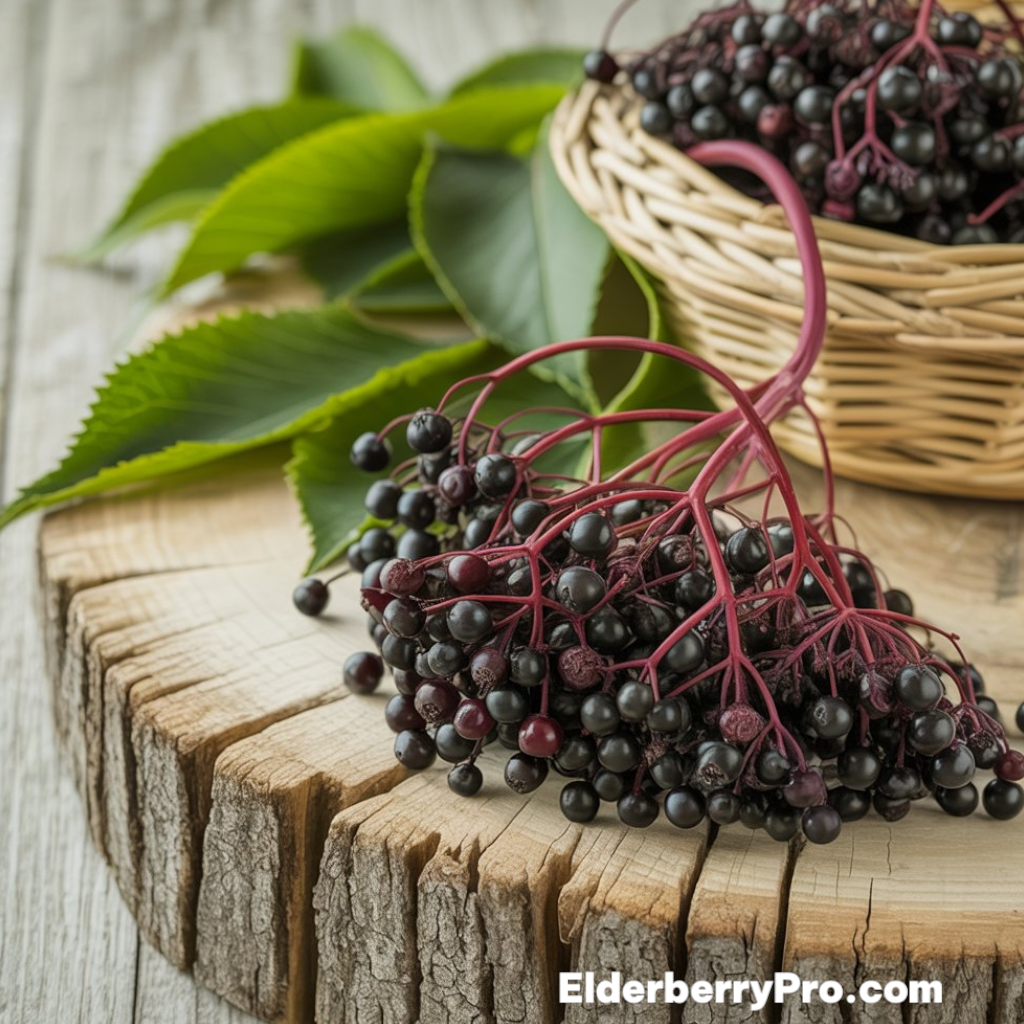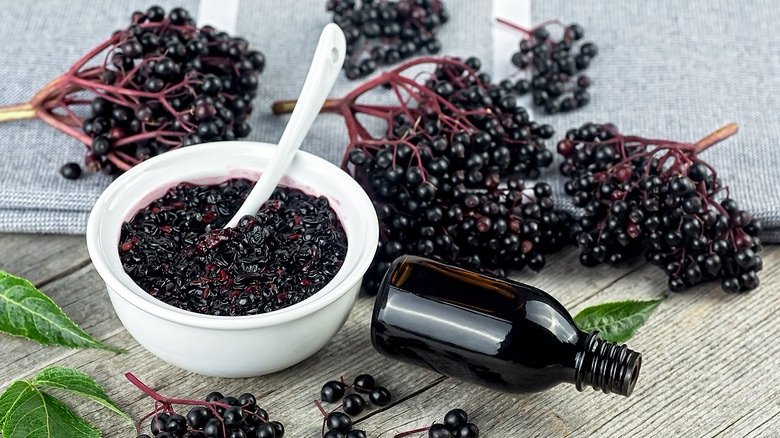
Why Elderberry Is Known for Immune Support
You’ve probably heard someone say, “Take elderberry—it helps your immune system!” But what makes this little berry such a go-to when cold and flu season hits? Elderberries have been used for centuries, and more recently, science has caught up to what herbalists have known all along. This powerhouse berry is rich in antioxidants and flavonoids, both of which play a key role in supporting your body’s natural defenses.
The buzz isn’t just hype—it’s rooted in both traditional wisdom and clinical research. That’s why so many people turn to elderberry to boost immune system health naturally and consistently.

What Makes Elderberry So Powerful?
Elderberries (specifically Sambucus nigra) are loaded with immune-friendly compounds like anthocyanins—those deep purple pigments that also happen to fight inflammation. But it’s not just color. These berries are packed with vitamin C, phenolic acids, and other antioxidants that support immune cell function.
One of the biggest reasons people swear by elderberry is because it doesn’t just help after you’re sick—it may also help reduce the severity and duration of symptoms when you do get hit with something. That’s why I keep elderberry in my wellness routine all year, not just in the winter.

Elderberry vs. Other Immune Boosters
You might wonder how elderberry stacks up against other big names like vitamin C, zinc, or echinacea. Here’s the thing—I use all of them, but elderberry is the one that’s stuck around long-term. It’s more versatile, and it doesn’t upset my stomach like high-dose vitamin C sometimes does.
While echinacea is popular for short-term use, elderberry feels like a gentler, daily immune nudge. And it plays well with zinc—especially when combined in something like the elderberry gummies I reviewed here, which include both vitamin C and zinc along with organic black elderberry extract.

Can Elderberry Help Prevent Colds and Flu?
There’s a growing body of research showing that elderberry might help shorten the length and intensity of colds and flu-like symptoms. One study found that people who took elderberry extract during a cold recovered 2–4 days faster than those who didn’t.
In my own experience, since I started using elderberry consistently, I get sick less often. And when something does sneak through, it usually doesn’t hit me as hard. That’s why I tell anyone looking for a simple immune boost—elderberry to boost immune system support just makes sense.

Elderberry in Daily Wellness Routines
It used to be something I only reached for when I was already sniffling, but now elderberry is part of my daily lineup—just like brushing my teeth or making coffee. I usually take it first thing in the morning, especially during the fall and winter months. It’s a small, simple act of self-care that makes a big difference.
And if you’re wondering where to start, I shared everything in my full review of the elderberry gummies I personally use. They taste great, are easy to take, and honestly—they’ve become my go-to when I feel a tickle in my throat or just want a little immune backup.

Who Should Consider Taking Elderberry?
If you’re someone who gets sick easily, has kids bringing home germs from school, or just wants an extra layer of defense during cold and flu season—elderberry might be a great fit. I started taking it when I was feeling worn down constantly, and it genuinely helped me bounce back faster and feel more resilient.
Even if you’re generally healthy, using elderberry to boost immune system support is kind of like giving your body an extra tool in its toolkit. It’s especially helpful if you’re a teacher, healthcare worker, or anyone else constantly exposed to other people’s germs.

How Long Does It Take to Work?
This was one of my first questions when I started using elderberry—how long does it take before I actually feel a difference? For me, I noticed the biggest changes within 2–3 weeks of taking it consistently. I didn’t feel superhuman or anything, but I wasn’t getting sick as often, and when I did, I bounced back quicker.
There’s no instant fix, but with regular use, elderberry becomes a steady background support—especially when paired with other immune-friendly habits like sleep, hydration, and a decent diet. It’s part of a bigger picture.

Forms of Elderberry – Which One Is Best?
You’ll find elderberry in all sorts of forms—syrups, teas, capsules, powders, even lozenges. I’ve tried nearly all of them, but gummies are by far my favorite. They’re portable, don’t need refrigeration, and don’t taste like medicine.
In my deep dive on these elderberry immune gummies, I break down why that specific brand stands out. Spoiler alert: organic, no junk fillers, and they combine elderberry with other immune allies like zinc and vitamin C.

Elderberry for Kids and Families
If you’re thinking about elderberry for your whole family—good news. Many elderberry products are made specifically for kids, too. When my little one started daycare, we added a kid-friendly elderberry gummy into the morning routine. It became just as normal as brushing teeth.
Of course, always double-check labels and dosages for kids. But elderberry can absolutely be part of a family-wide immune support game plan. I wrote about this more in our FAQ page where we break down what’s safe for children and adults alike.
If you are looking for the elderberry gummies for children, you can find them here!

What to Look for in a Good Elderberry Supplement
Not all elderberry products are created equal. Some are loaded with sugar, others barely contain any real elderberry at all. When you’re buying elderberry to actually boost your immune system, here’s what I always look for:
- Sambucus nigra extract (the kind backed by research)
- A meaningful dose of elderberry per serving
- Added immune support like vitamin C and zinc
- Organic or non-GMO ingredients
- No unnecessary fillers, artificial colors, or added sugars
The one I use checks all those boxes, which is why I put together this in-depth review to save you the guesswork.

Can You Take Elderberry Every Day?
Short answer: Yes, I take it daily—and I know many people who do, especially during the colder months or when sickness is going around. Elderberry is generally safe for regular use as long as you’re sticking to the recommended dosage on the label.
That’s part of why I like gummies—they make it super easy to stay consistent without feeling like you’re choking down pills. If you want to see exactly which ones I recommend, check out my go-to elderberry gummies review.
Can Elderberry Be Taken With Other Vitamins?
Absolutely. Elderberry pairs especially well with zinc and vitamin C—they’re all immune powerhouses, and many quality supplements combine them into one. That’s one less bottle in your cabinet and a more complete approach to immune support.
The elderberry gummies I use actually include all three: elderberry, zinc, and vitamin C in one chewable serving. It’s a triple punch that just makes sense.

Is Elderberry Backed by Science?
It is—and this matters. Clinical studies have shown that elderberry, especially Sambucus nigra, can reduce the length and severity of colds and flu when taken at the first sign of symptoms. It’s not magic, but it’s one of the few natural remedies with actual science behind it.
If you’re curious about the history and how elderberries were used centuries ago for healing, you might like this look into elderberry’s past uses. It’s fascinating to see how far back its healing reputation goes.

So, Is Elderberry Right for You?
If you’re tired of feeling rundown or constantly catching whatever’s going around, I really think elderberry is worth trying. I’ve personally seen how using elderberry to boost immune system strength can make a big difference—not just for me, but for my whole family.
Start small, stay consistent, and pick a product that actually delivers. If you’re not sure where to start, this honest elderberry gummy review is a great place to begin. Your immune system deserves the backup.
As an Amazon Associate we earn from qualifying purchases through some links in our articles.